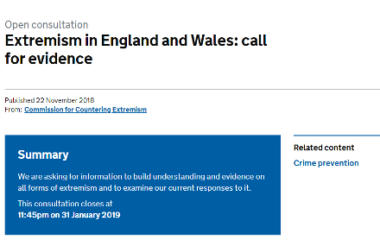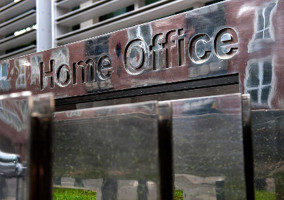The Commission for Countering Extremism, is carrying out a first-of-its-kind study to examine the scale and harm of extremism in our country.
We are calling on those working in the civil society sector to share their views, experiences and evidence on extremism in all its forms as part of our public consultation.
Civil society organisations and charities are uniquely placed to tell us about the harm extremism is causing and what more is required to counter it.
As lead commissioner I have been speaking to civil society groups and it is clear extremism is a real concern. Extremism threatens human rights whether freedom of expression, religion or belief and gender equality. Examples shared with me include mixed-faith couples who have had their wedding days disrupted by religious hardliners, people who have experienced abuse because they follow a different interpretation of religion or those who, because of their ethnic identity, are subjected to abuse, boycotts and even violence.
I know, from travelling the country speaking to people, that we are seeing rising levels of extremism, division and hatred. I see how their humanity, rights and dignity are trampled on by the actions of extremists. Now more than ever we need to challenge extremism and to do so in order to defend and uphold our human rights.
It seems apt to call on you for your views and experiences today. On this day 70 years ago, the General Assembly of the United Nations laid the foundations for the human rights protections we have in the UK and across the world.
The UN adopted the Universal Declaration of Human Rights – the first international agreement on the basic principles of human rights.
Based on the recognition of individual human rights, they include the right to life, liberty, freedom of expression and non-discrimination, regardless of race, colour, sex, language, religion, political or other opinion. All human beings, the UDHR makes clear, are born free and equal in dignity and rights.
In my role as the country’s lead commissioner for countering extremism, I see how extremism threatens and undermines these very rights. As a long standing human rights advocate who has been working to counter extremism for more than a decade, I have always been struck by how extremists of all persuasions and ideologies, have a fundamental opposition to human rights and equality. Their activism is based on ‘othering;’ they seek to deny the human rights of others who they consider to be part of the ‘out-group’ and engage in hatred towards them.
Far right extremists often promote hostility of ethnic minorities, Jews, Muslims and others. Whether encouraging discrimination and advocating for such policies, or even calling for violence, such groups of people are considered to be sub-human or not worthy of the same human dignity as them. The very notion of human rights is rejected wholesale.
We also see hatred and hostility by Islamist extremists: hatred towards non-Muslims, Jews and other Muslims. Women’s rights and LGBTQ rights are despised. Freedom of expression, religion or belief and non-discrimination are rejected by extremists. Other similarities can be seen with extremists of all kinds.
Countering extremism is a human rights issue, yet sadly this is something that is not recognised enough. This must change. If we care about protecting human rights, challenging extremists is a vital area of work, as the latter threaten these rights. Nor can we only focus on challenging one form of extremism while ignoring others. Otherwise we challenge some extremists while condoning the actions of other extremists who continue to harm the human rights of others. This undermines the very principle of human rights as being universal and indivisible.
Traditionally people worry about the harm state-led counter-extremism policies may have. I recognise these concerns. We have seen how countries seek to silence dissent and undermine human rights themselves in the name of ‘counter-extremism.’ I recognise the exploitation of both counter extremism and human rights in such a situation and this is unacceptable. The balance between civil liberties and national security is an important one and is a role the independent reviewer of terrorism legislation takes with great commitment. I have made clear since my appointment that in our collective struggle against extremism, human rights norms must be defended.
However, we also need to understand that human rights violations can also be carried out by extremists, as non-state actors. I have spoken to such victims and there is little recognition of this or recourse for justice for such victims.
On Human Rights Day, we must also pay tribute to brave, courageous human rights defenders. Across the world they experience hostility, threats, violence, torture and even death. They do so because of their belief in the need to create a world which advocates for equality, non-discrimination and freedom.
I have also seen how counter-extremists in our own country, when they have stood up to extremists and defended vulnerable people in their communities, have faced abuse and intimidation as a result. Just as extremists target human rights defenders, they often also target counter extremists. We must support those, who in the face of extremism are trying to push back.
On this important day – when we celebrate the first agreement of the basic principles of human rights – I want to unite all those who care about human rights and those countering extremism to collectively work together in the recognition that the fight for human rights is also a fight against extremism. By defending human rights, we counter extremism.
In these times of rising extremism and division, we must stand together for the human rights we have fought for and reaffirm our common humanity, now more than ever, just as the General Assembly of the United Nations did in 1948. Please share your views, experiences and evidence on extremism with us.
|
Related Articles












